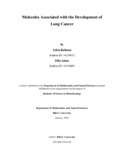Molecules associated with the development of lung cancer
Abstract
Molecular association with lung cancer is one of the most important and a very primary queries to
understand the molecular basis of lung cancer and its development mechanism. There are different
factors involved with the development of lung carcinoma. Smoking, environmental hazards, and
occupational hazards are the main risk factors. Different molecules are involved differently in the
development, progression, and spread of lung cancer. Similarly, some molecular associations are
also found in the diagnosis and treatment of this disease. Epigenetic alterations have been reported
widely in the sector of lung cancer which plays a major role in the genesis of lung cancer. Here in
this review, we try to provide an overview of different molecular associations with lung cancer in
different steps including- risk factors, disease induction, disease catalyzation, disease sustenance,
epigenetic factors, biomarker appearance, and therapeutic purposes. We give more emphasis on
different mutational changes which induce, accelerate and animate this deadliest disease. Our
focus is also on different therapeutic aspects of lung cancer.

